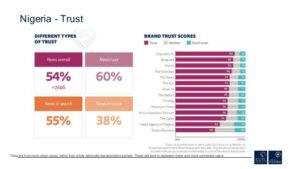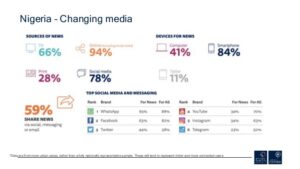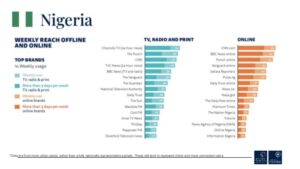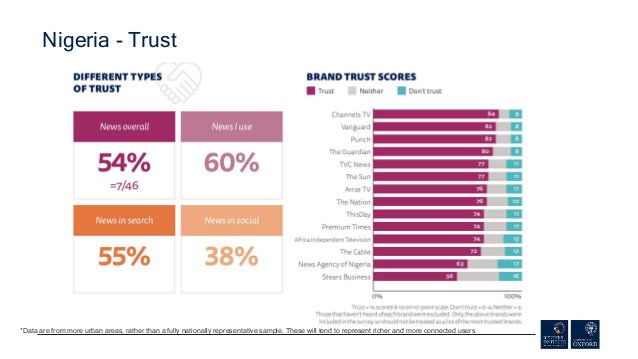Trust in news is on the increase worldwide, including Nigeria in the wake of the pandemic according to the Digital News Report 2021 released on Wednesday.
The Report by the Reuters Institute for the Study of Journalism at the University of Oxford, UK, is the most comprehensive annual report on news consumption worldwide.
This year’s report covers 46 markets, including Nigeria and five new ones: India, Indonesia, Thailand Colombia and Peru.
It provides evidence that some news organisations have benefitted from a desire for reliable information over the last year – in terms of higher reach, higher trust and more subscribers.
Nigeria highlights

While 44% of the overall respondents to the survey for the report said they trust news most of the time, partly reversing falls in average trust over the last few years, 54% in Nigeria said they trust news in general.
Despite 78% of the Nigerian respondents saying they get their news via social media, only 38% say they trust the news they access on these channels.
84% of respondents said they use smartphones to access news, while only 41% say the same for computers, 11% for tablets.
With 65% using the app for news, WhatsApp is the most popular platform in Nigeria, while Facebook (63%) is also a common news source. 23% of respondents say they use Telegram for news, while 50% say they use the app for any purpose.
84% of respondents say they use smartphones to access news, while only 41% say the same for computers, 11% for tablets.


Global findings
The global findings of the research, based on an online survey of 92,000 people in 46 media markets, representing the views of more than half the world’s population, indicate that the pandemic has also accelerated shifts to digital, social and mobile environments putting further economic pressure on publishers worldwide.
Overall, only a minority are prepared to pay for online news while younger generations continue to rely on new, convenient ways to access news that are proving hard to monetize.
Across 20 countries where publishers have been actively pushing digital subscriptions, 17% said that they have paid for some kind of online news in the last year. That’s up by two points in the last year and up to five since 2016. Despite this, the vast majority of consumers do not pay for any online news.
More respondents said they had seen more misinformation about coronavirus than any other subject, including politics. They expressed the most concern about the role played by politicians (29%) in spreading inaccurate or misleading information about COVID-19, followed by ordinary people (16%), activists (15%) and journalists (11%).
Across countries, 74% say they still prefer news that reflects a range of views and lets them decide what to think. Most also think that news outlets should try to be neutral on every issue (66%), though some younger groups think that ‘impartiality’ may not be appropriate or desirable in some cases, such as social justice issues.
Misinformation and COVID-19
Concern about misinformation remains high, with 58% of the global sample expressing concern about what is true or false on the internet when it comes to news. More respondents said they had seen more misinformation about coronavirus than any other subject, including politics.
They expressed the most concern about the role played by politicians in spreading inaccurate or misleading information about COVID-19, followed by ordinary people, activists and journalists. Concerns was even higher in Brazil (41%) where President Jair Bolsonaro has made many false claims about the pandemic.


